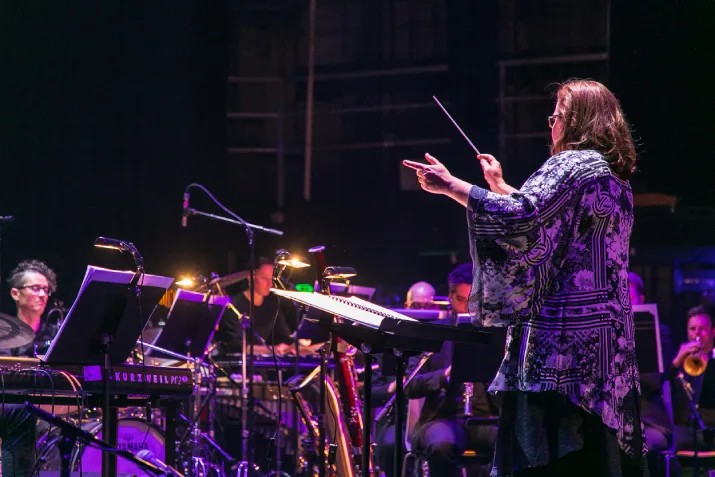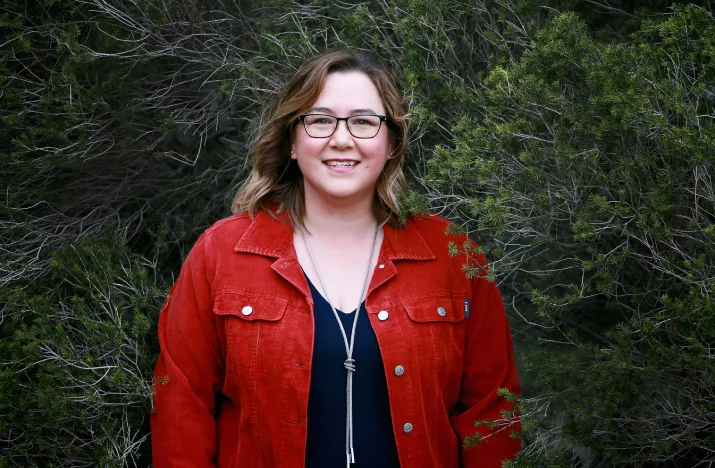An Aussie composer on how to get into the music industry
By Chloe Cann
Is it hard to make it in the local music industry? Jessica Wells, a successful composer, orchestrator and arranger reveals the challenges and opportunities that you might face on your journey to stardom.
As an exciting, creative, and ever-evolving industry, it will come as little surprise that establishing a career in music is no easy feat. And yet, in Australia, there are signs that the job market is picking up at a time when skilled professionals are in short supply.
Music industry pundits suggest that many left the industry as the COVID-19 pandemic raged, forcing the closure of live music venues and putting music festivals on ice. And while the sector is now practically back in full swing, there’s no longer enough talent to fill the gaps.
Such is the demand that Australia’s Skilled Occupation List even includes a handful of music industry jobs eligible for sponsorship, and Jobs and Skills Australia suggests that the employment outlook is ‘strong’, with a growth rate of nearly 10% predicted by 2026.
How hard is it to get into the music industry?
The difficulty of breaking into the industry depends, of course, on what it is you want to do. While there’s only so much room on the stage, there are plenty of opportunities behind it.
Jessica Wells is an Australian composer, orchestrator, arranger, and business owner. She boasts a portfolio of work that many could only dream of, her name splashed across the credits of projects that span film, TV, theatre, concerts, album recordings and even on-hold music.
You’ve likely happened upon Jessica’s diverse body of work without knowing. She was an orchestrator on the 2022 blockbuster biopic Elvis and a copyist on The Lego Movie. She’s also arranged and produced music for The Wiggles and many of Australia’s major orchestras, and written music for the Victorian Opera. She even has her own IMDB page.
Despite Jessica’s impressive career to date, she emphasises that hers is not an overnight success story.
I'm turning 50 this year, so it's taken a long time to get to this point where I can be trusted to write music [for, say] the Sydney Symphony Orchestra. Not many people get to do that, so I feel very lucky and grateful.
If you really want to make a name for yourself in the industry, you have to be prepared to work hard, she says. “[After I completed my third] degree I came sort of blazing out of there with nominations and screen awards for two short films and a documentary, and I thought: ‘yeah, I'm gonna be a film composer.’ And I found it really difficult to crack into the industry, even with those nominations.”
Not long after completing her third degree in music, Jessica had two children, which effectively put her big career goals on hold. “Film composers work their butts off,” she says. “They work really, really hard. They have late nights and work weekends; they don't see their families a lot and I couldn't do that with two babies. I just focused on building my business, Jigsaw Music, to help other composers and I thought, ‘well, at least I'm honing my skills’.
"Eventually, once my kids were both in school, [and I’d] just turned 40, I got back into writing music again. And now, at nearly 50, I’m finally getting the big gigs.”

Passion is a non-negotiable if you want to get ahead in the industry, thanks to the high level of competition. “You have to have a lot of drive,” she says, adding that passion is also the key to sustaining your career; because even though Australia’s music industry is in good shape today, the income doesn’t always match your output.
“[In] Australia we struggle with budgets,” she says. And as a whole, it can be a fickle field to work in. “We've had a lot of ups and downs in the industry lately with the strikes in Hollywood. We lost a lot of work during that and COVID.”
What are the barriers to getting a job in the music industry?
While these recent setbacks have been challenging, they have led to some unexpected wins for those in the industry. Decreasing production costs, for example, have led to a growth in the number of ‘bedroom producers’, and software innovations have allowed composers and arrangers to work from anywhere in the world, rather than relocating to find work.
“It's a really global industry now,” Jessica explains. “I think COVID made a huge difference to what we can do. I produced recordings for a big Indian action movie called Brahmastra from my bedroom. I did a short film for a guy who's living in Helsinki. I do a lot of recordings here for Hollywood. It's very easy to deal with people's files, process them, make scores and send them back over.”
But there are still some barriers to entry, notes Jessica. Most notably, the lack of diversity.
“I went to university in the early 90s [and] it was so male dominated,” she says. “It was tricky to get anywhere because in the film industry a lot of the directors and producers are male, and the core team will most likely be the director’s mates.”

Jessica’s experience is still reflected in the statistics today, across the industry. Women are estimated to make up less than 20% of Australian songwriters, for example. And numerous studies have also found that people of colour are even more underrepresented.
While there’s still a lot of ground to make up, thankfully it seems that some progress is slowly being made.
For example, the new Centre for Arts and Entertainment Workplaces will help hold music organisations to account on their working cultures. Mentorships and grants offered by organisations like Australian Independent Record Labels Association and APRA AMCOS also aim to empower female-identifying and non-binary musicians.
Can you study music at uni?
Absolutely. Not only can you study music at university, but there are several different courses available.
If you have a clearly defined career path in mind and you’re looking to specialise, you could go with a course like a Diploma in Music Technology or a Bachelor of Musical Communication. If you’re simply looking to pursue a broad interest in the subject and see where the journey takes you, consider a Bachelor of Music.
Not sure what to study?
Take our 2-minute quiz to find the right course for you.
Can a music degree get you a job?
While a music degree is by no means the only gateway, it can prove a stepping stone. And it can also help to lift the veil on what may otherwise seem a secretive industry with few clearly defined career pathways.
Jessica has both a Bachelor and a Master of Music in Composition, as well as a Master of Arts in Screen Composition.
You learn all different types of music when you’re studying, which I think is really important. [Plus] technology’s a big one, you’ve gotta get your head around it.
"Then after that it’s about who you know. Getting that foot in the door early is hard.”
And in some cases, the connections you make through studying can actually help you find that elusive first job. “I always say treat your lecturers like your clients,” she says. “[Because] occasionally I’ll get a random email from someone saying ‘my composer fell through, would you be able to refer someone?’”
Careers in music
When talking about making a career in music, people often assume that means working as a musician or singer. But there are many other jobs out there in the music industry today. For example, you might choose to become a:
Composer
Conductor
Songwriter
Orchestrator
Copyist
Music producer
Concert promoter
Audio engineer
Music manager
Agent or booker
Record label executive
DJ
Music teacher
Music therapist
Music programmer
Festival organiser
Singer or musician
How to get a job in the music industry
Jessica offers some parting words of advice for those keen to make it in the industry: “What I encourage students to do is to say yes to everything; just go and learn whatever you can, in whatever area you can. Sometimes you have to do a couple of freebies to get your feet in the door.”
Despite all the challenges, it can be a rewarding career, she adds: “It's the chance to do something really creative and beautiful.”
Keen to launch your own musical career? Discover the music courses you can study online through Open Universities Australia.
Get personalised advice about online study
A student advisor will call you at your preferred time to answer your questions.



